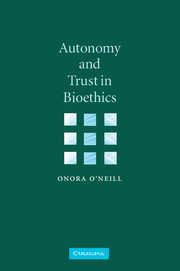Book contents
- Frontmatter
- Contents
- Preface
- Frontispiece
- 1 Gaining autonomy and losing trust?
- 2 Autonomy, individuality and consent
- 3 ‘Reproductive autonomy’ and new technologies
- 4 Principled autonomy
- 5 Principled autonomy and genetic technologies
- 6 The quest for trustworthiness
- 7 Trust and the limits of consent
- 8 Trust and communication: the media and bioethics
- Bibliography
- Institutional bibliography
- Index
2 - Autonomy, individuality and consent
Published online by Cambridge University Press: 06 November 2009
- Frontmatter
- Contents
- Preface
- Frontispiece
- 1 Gaining autonomy and losing trust?
- 2 Autonomy, individuality and consent
- 3 ‘Reproductive autonomy’ and new technologies
- 4 Principled autonomy
- 5 Principled autonomy and genetic technologies
- 6 The quest for trustworthiness
- 7 Trust and the limits of consent
- 8 Trust and communication: the media and bioethics
- Bibliography
- Institutional bibliography
- Index
Summary
THE ORIGINS OF INDIVIDUAL AUTONOMY
Most contemporary accounts of autonomy see it as a form of independence. Independence is relational: it is independence from something or other. So we may reasonably ask from what autonomous persons and autonomous action are independent. Many sorts of action are independent in some respects but dependent in others, and some sorts of independence do nothing to show that an action is right or valuable. Some independent action is spontaneous, disciplined, altruistic and even heroic; some is self-centred, pig-headed, impulsive, random, ignorant, out of control and regrettable or unacceptable for these and many other reasons.
A standard response to this deflationary thought is to see autonomous choosing as independent in some special and desirable way. Individual autonomy is not a matter of mere, sheer independence, of the sort praised by pop-existentialists, or aspired to by my streaking student. Whatever else people think about individual or personal autonomy, they do not equate it with mere choice. Yet they disagree spectacularly about what makes some choosing autonomous, or more autonomous than other choosing, and other choosing less autonomous. A look at some current conceptions of individual autonomy that have been influential in bioethics and beyond shows that weight, perhaps excessive weight, is sometimes placed on quite minimal and even implausible conceptions of individual autonomy.
INDIVIDUAL AUTONOMY IN A NATURALISTIC SETTING: MILL
Although a notion of autonomy can be traced back to antiquity, the conception of individual autonomy is less venerable.
- Type
- Chapter
- Information
- Autonomy and Trust in Bioethics , pp. 28 - 48Publisher: Cambridge University PressPrint publication year: 2002
- 4
- Cited by



